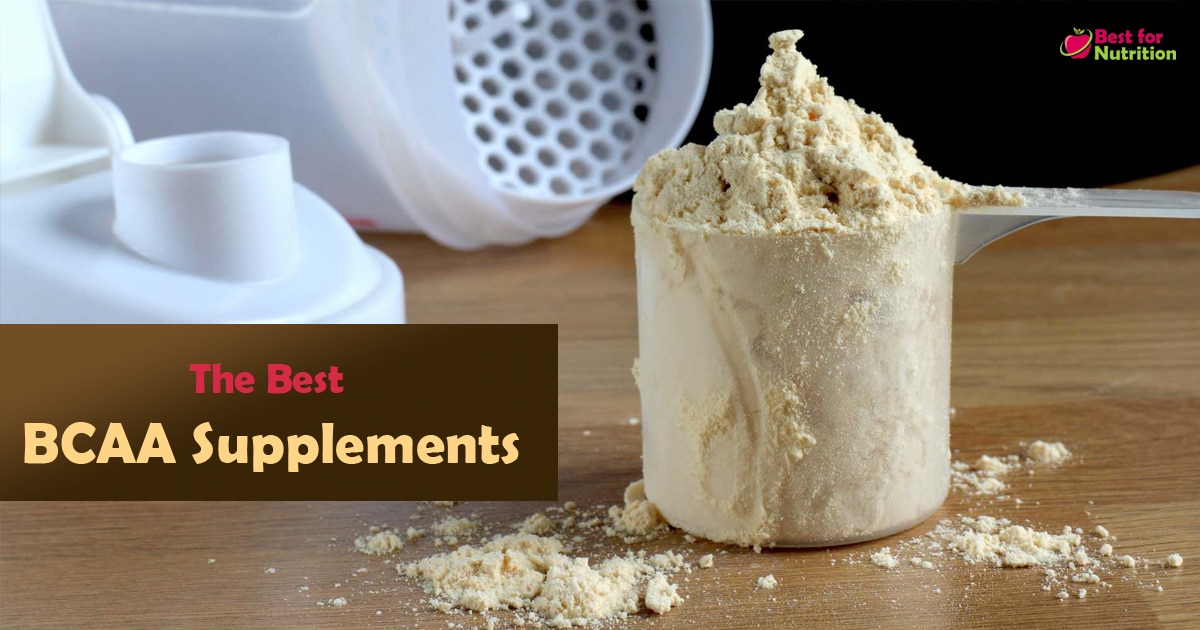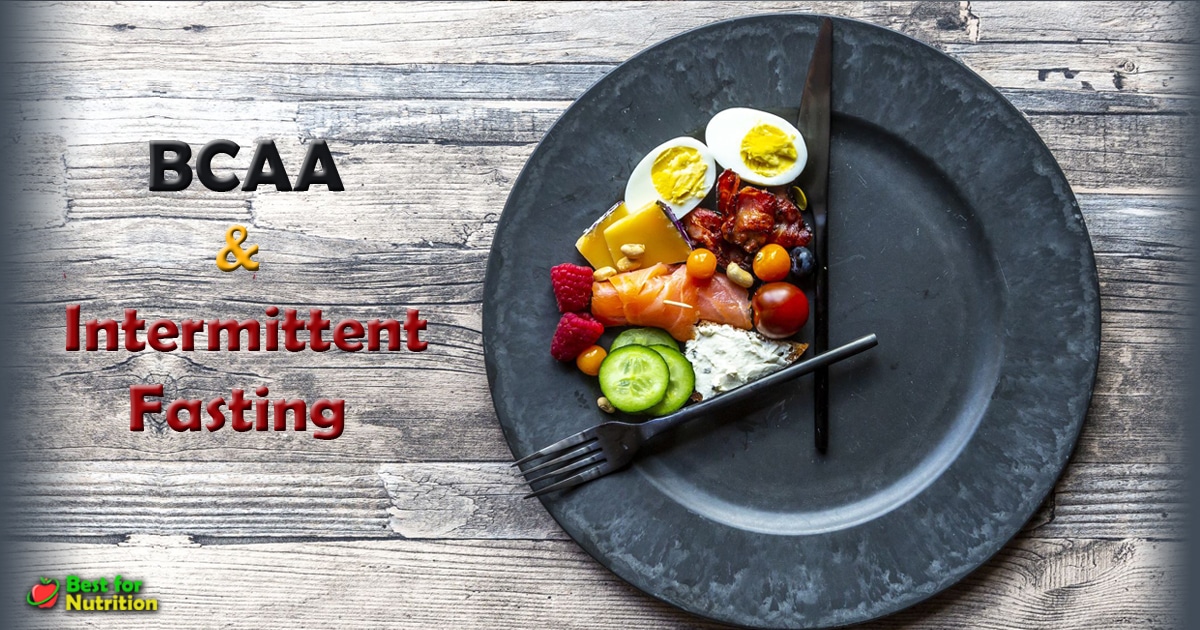BCAA and glutamine supplements are both popular names in the fitness industry.
The many muscle-building benefits of these amino acids can prove to be advantageous in reaching your goal and perform to your full potential.
BCAA and glutamine play critical roles in the repair and rebuilding of muscle tissue. But which one is better or should you take both BCAA and glutamine?
In this article, we will compare the benefits of BCAA and glutamine supplements, as well as, how to use them to optimize your fitness training.

What is BCAA?
There are 20 different amino acids that link up in several ways to make up the thousands of different proteins in the human body (1).
Nine of them are the essential amino acids that your body can’t produce and must be obtained through diet (2).
Leucine, isoleucine, and valine are three of those essential amino acids that are known as branched-chain amino acids (BCAAs). They have acquired this name due to their branched chemical structure (3).
BCAAs are available in protein-rich-foods such as eggs, meat, and dairy products. They are also available as supplements that are sold in both powder and pill form (4).
Summary: Leucine, isoleucine, and valine are BCAAs that the body needs to obtain from protein-rich foods. They are also available as supplements in pill and powder form.
What Role does BCAA Play in Muscle Health?
BCAAs are extremely important for your overall body functions, but they are specifically of great benefit for muscle growth (5).
They are responsible for transporting nitrogen into your muscles, providing the body with nutrients it needs to promote anabolic muscle action (muscle growth).
BCAAs boost the body to produce more insulin, which allows your muscles to absorb and use the glucose in the blood. They work towards producing muscle growth and preventing muscle breakdown (6).
BCAAs help your body to release hormones that are crucial for muscle growth such as testosterone, GH, and IGF-1 (7).
Amongst all three BCAA, leucine is the most important in the body (8). It increases protein synthesis post-workout. The isoleucine and valine improve performance during a workout and helps in quick recovery after long workouts (9).
Muscle Building Benefits of BCAA Supplements
BCAAs can be taken as a pre-workout, intra workout or post-workout supplement due to the array of benefits it has.
- BCAA supplements promote a period of anabolism ( when the body synthesizes muscle protein) for a longer duration than catabolism ( when the body breaks down muscle protein) leading to muscle growth (10).
- They also provide fuel to your body with free circulating amino acids, which are easily absorbed, enhancing muscular function (11).
- BCAA helps increase endurance level as they enhance the size and energy storage capacity of muscle fibers (12).
Summary: BCAA helps build muscles, reduce DOMS, aids in recovery, and improve endurance in people who work out.
What is Glutamine?
Glutamine is a non-essential amino acid used in every biological function and is the only amino acid that can cross the blood-brain-barrier (13).
In fact, 60% of the skeletal muscle in the human body is made of glutamine. This makes it the most abundant amino acid in the body (14).
However, at certain times, the glutamine needs of your body are more than its ability to produce. Therefore, it is tagged as the conditionally essential amino acid, which means it must be obtained from the diet under certain conditions such as illness or injury (15).
Poultry products like lean meats and eggs, dairy-based protein powders like whey and casein, contain high concentrations of glutamine (16).
Glutamine plays a bigger role in the body. In addition to supporting protein metabolism, it also boosts the immune function (17).
Summary: Glutamine is the most abundant amino acid in the body that promotes intestinal health and boosts immunity. It also promotes muscle growth and preserves protein stores.
Glutamine Benefits on Muscle Health
Glutamine has been shown to have a variety of benefits. Glutamine promotes a positive nitrogen balance which leads to muscle growth.
A couple of grams of glutamine supplement per day has shown to cause up to a 400 percent increase in growth hormone production. This increases muscle protein synthesis (18).
Muscle Building Benefits of Glutamine Supplements
People, who are active like athletes and players, and those who are into muscle building and weight lifting, have benefited from glutamine.
- Glutamine speeds up the healing process by maintaining cell hydration and volume. It helps with post-workout recovery as well as injuries like burning (19).
- Glutamine directly boosts the synthesis of protein in the body (20).
- It helps boost your immune system reducing the risk of sickness (21).
- It helps repair damage to the intestine and the digestive system, which ensures the highest absorption and use of important nutrients (22).
- Glutamine increases the growth of hormone production that enhances muscle growth and strength (23).
Summary: Glutamine increases muscle protein synthesis by increasing the hormone productions responsible and helps speed up the healing process post-workout. It boosts immunity and maintains good intestinal health.
Differences Between Glutamine And BCAA
Both glutamine and BCAA are amino acids that enhance muscle recovery. Glutamine supplementation provides the body its most heavily used amino acid whereas BCAAs provide the three amino acids that are extremely effective as a muscle growth promoter.
However, studies confirm that glutamine supplementation only helps those who are deficient in this particular amino acid for a reason such as intense workout, food deficiency, injuries, or illness (24).
Under normal circumstances, glutamine is sufficiently produced in the body. But, BCAAs need to be supplied from food or supplement, and an increase in physical activity increases its need.
BCAAs can be taken thrice a day before, during, and after the workout. 0.03-0.05 g/kg body weight per hour or 2-4 g per hour during exercise and after exercise works very well.
Glutamine can be supplemented thrice a day with a 5-gram dose. Morning, post-workout, and just before bed can work very well for muscle soreness and recovery after intense exercise (25).
Summary: When it comes to muscle building for healthy individuals BCAAs are much more beneficial than glutamine, which is made sufficiently by the body in normal circumstances. But, special circumstances do benefit from glutamine supplementation.
Which is Better: BCAA or Glutamine?
It is always advised by nutritionists to take a balanced diet. It takes care of all the macro-nutrients the body needs. In case you are into workouts or other intense training, supplements do help in providing extra nutrients that can be beneficial for you.
If you really have to select one, it is probably better to choose BCAAs over glutamine as they are supremely important for muscle growth.
Not only can the body make glutamine, but it can also be made from BCAAs in the body, mainly leucine (26).
Therefore, if you really have to choose between the glutamine supplement and the BCAA supplement, then the latter will be a better choice.
Summary: Even though both are available from food, additional BCAAs, and glutamine supplements can support your fitness plan. Glutamine is also made in the body. In fact, leucine, one of the BCAAs can make glutamine when needed.
A Potent Combo: BCAA With Glutamine
BCAA and glutamine, both can be taken together. Have it first thing in the morning and immediately after your training session. Taking them both together will ensure that your body is under a continuous supply of amino acids thus preventing muscle breakdown and quick recovery.
BCAAs can support building more muscle mass and glutamine can help you recover after those hardcore workouts. Make sure you check the dosage and timing properly and go about it.
During work-out, your body experiences quite an amount of physical stress. When combined, the dosage would be 3 grams of BCAA and 5 grams of glutamine. This boosts endurance and strength as well as muscle recovery and soreness (27).
You can take it, 30 minutes before a workout, and 30 minutes after workout. This will help in replenishing you with the amino acids for recovery.
Summary: Both glutamine and BCAAs can be taken together to maximize your workout needs. They can be taken in the morning to prepare your body for the workout as well as after your training session for quick recovery.
The Final Note
BCAA and glutamine are fundamental in building muscles. To achieve the fitness you crave, these as supplements can very well support your fitness regime, by nourishing your body and help you recover better.
Each of them is specifically beneficial in certain ways and can be consumed individually at different times for optimum benefit.
Glutamine focuses more on the immunological benefits of the athlete. It has been observed to reduce post-workout soreness and be beneficial in recovery after exercise.
BCAA is focused mainly on protein synthesis of the muscles, acts as an energy source during exercise, reduces soreness, and helps in recovery after a workout. It is also thought to increase endurance while working out.
They can also be consumed together to benefit in every way.





